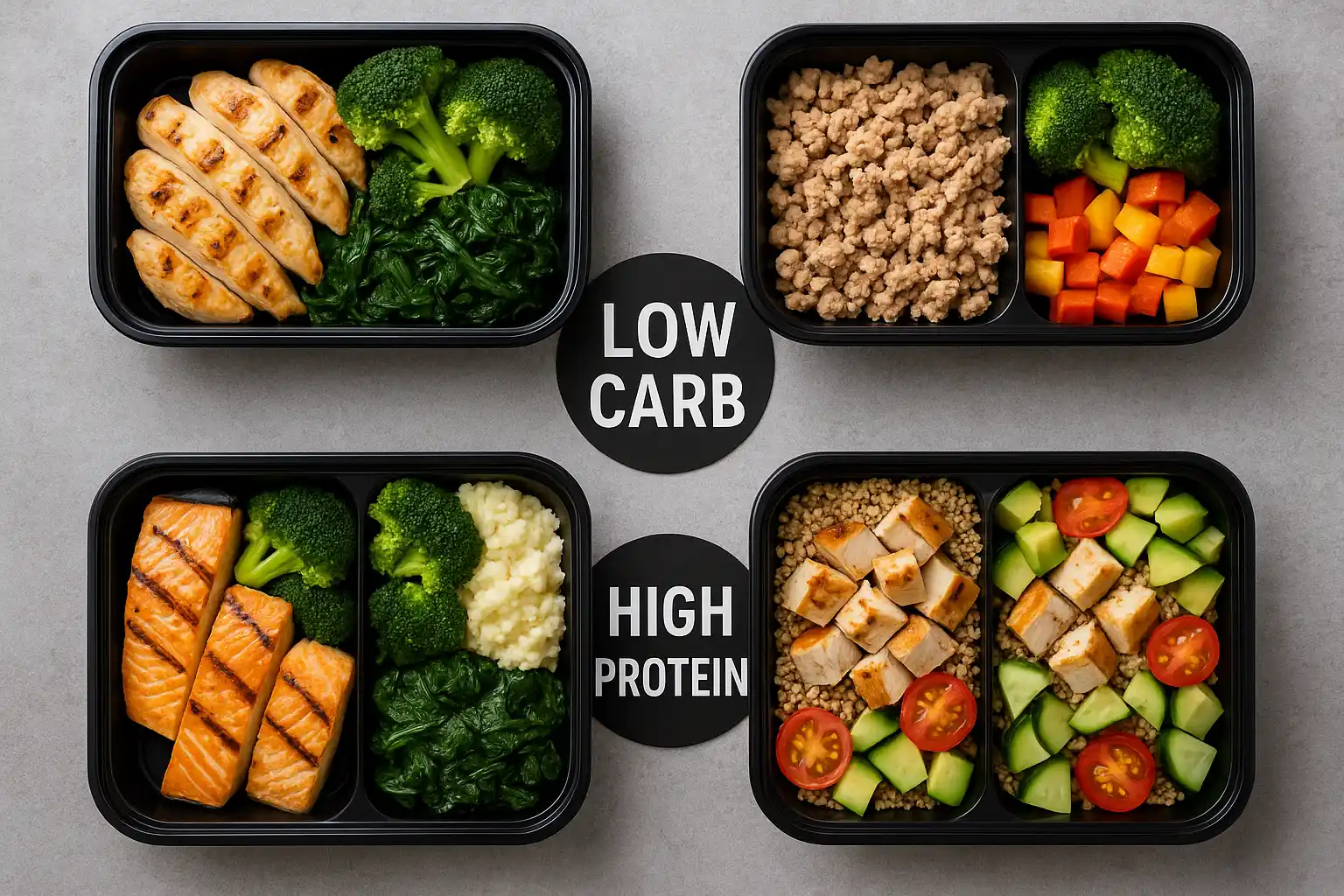For many, the journey towards optimal health and fitness involves a strategic approach to nutrition, often focusing on macronutrient balance. Among the most effective dietary strategies is the combination of high protein and low carbohydrate intake, particularly when streamlined through meal preparation. “High protein low carb meal prep” is not just a dietary trend; it’s a powerful method to enhance satiety, support muscle maintenance or growth, and promote fat loss. This approach minimizes sugar cravings and energy fluctuations, providing a steady fuel source throughout your day. This article will dive into practical “low carb high protein meal prep hacks,” offering innovative techniques and recipes to simplify your dietary regimen. We’ll explore how to efficiently prepare delicious, nutrient-dense meals that align with your low-carb, high-protein goals, ensuring you’re always fueled for success, much like an elite athlete meticulously preparing their body for the rigorous demands of a championship series, ready for every critical moment, even a Game 7 NBA Finals.
Table of Contents
I. The Synergy of Low Carb High Protein Meal Prep
The combination of a low-carbohydrate and high-protein diet offers distinct advantages for weight management, metabolic health, and sustained energy. When integrated with meal preparation, these benefits are amplified. Protein is renowned for its satiating effect, helping to curb appetite and reduce overall calorie intake [1]. Simultaneously, a low-carb approach encourages the body to utilize fat for fuel, potentially leading to more efficient fat burning. By embracing “high protein low carb meal prep,” you gain control over your food choices, eliminate guesswork, and ensure consistent adherence to your dietary principles, even amidst a busy lifestyle. Studies have shown that higher protein intake, especially when combined with lower carbohydrate consumption, can significantly improve body composition and metabolic markers [2].
II. Essential Low Carb High Protein Meal Prep Hacks
Efficiency is paramount when it comes to low carb high protein meal prep. These hacks focus on smart ingredient choices, batch cooking techniques, and clever substitutions to make your preparation seamless and effective.
A. Low Carb High Protein Meal Prep: Smart Ingredient Selection
Choosing the right ingredients is the first and most crucial hack. Focus on nutrient-dense, low-carb, and high-protein foods.
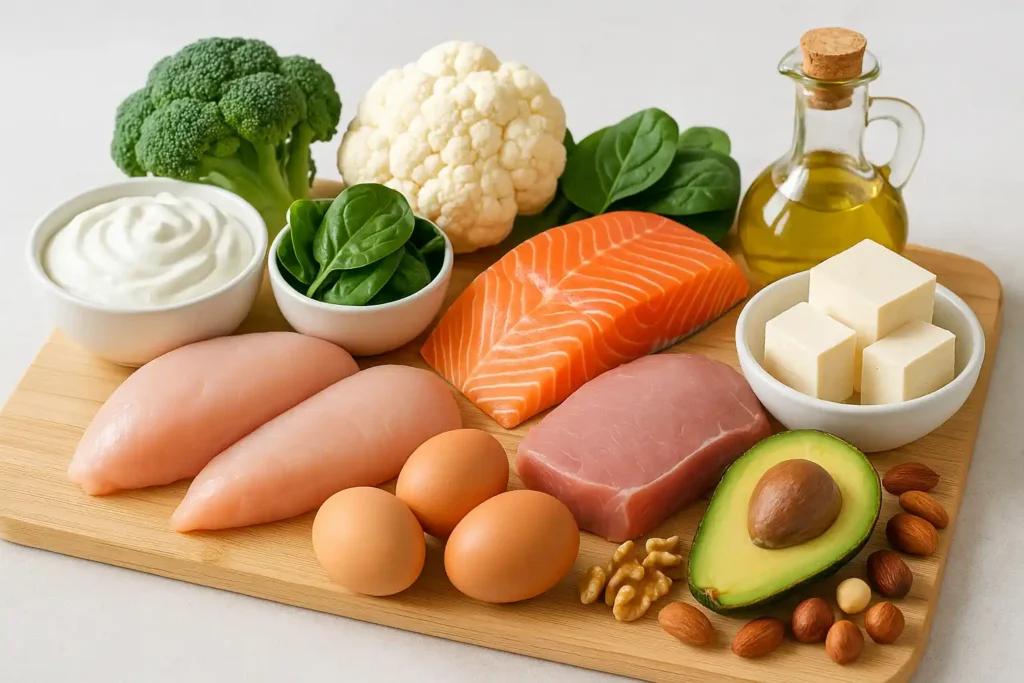
- Proteins: Prioritize lean meats (chicken breast, turkey, lean beef), fish (salmon, cod, tuna), eggs, and high-fat dairy (full-fat Greek yogurt, cottage cheese). For plant-based options, consider tofu, tempeh, and certain protein powders.
- Low-Carb Vegetables: Load up on non-starchy vegetables like leafy greens (spinach, kale), broccoli, cauliflower, asparagus, bell peppers, zucchini, and green beans. These add volume, fiber, and essential micronutrients without significant carbs.
- Healthy Fats: Incorporate avocados, nuts (almonds, walnuts, pecans), seeds (chia, flax, hemp), olive oil, and coconut oil. Fats are crucial for satiety and energy on a low-carb diet.
- Low-Carb Alternatives: Stock up on cauliflower rice, zucchini noodles (zoodles), shirataki noodles, and low-carb tortillas. These are excellent substitutes for high-carb staples.
B. Low Carb High Protein Meal Prep: Batch Cooking Techniques
Batch cooking is the cornerstone of efficient meal prep. These techniques are particularly effective for “low carb high protein meal prep.”
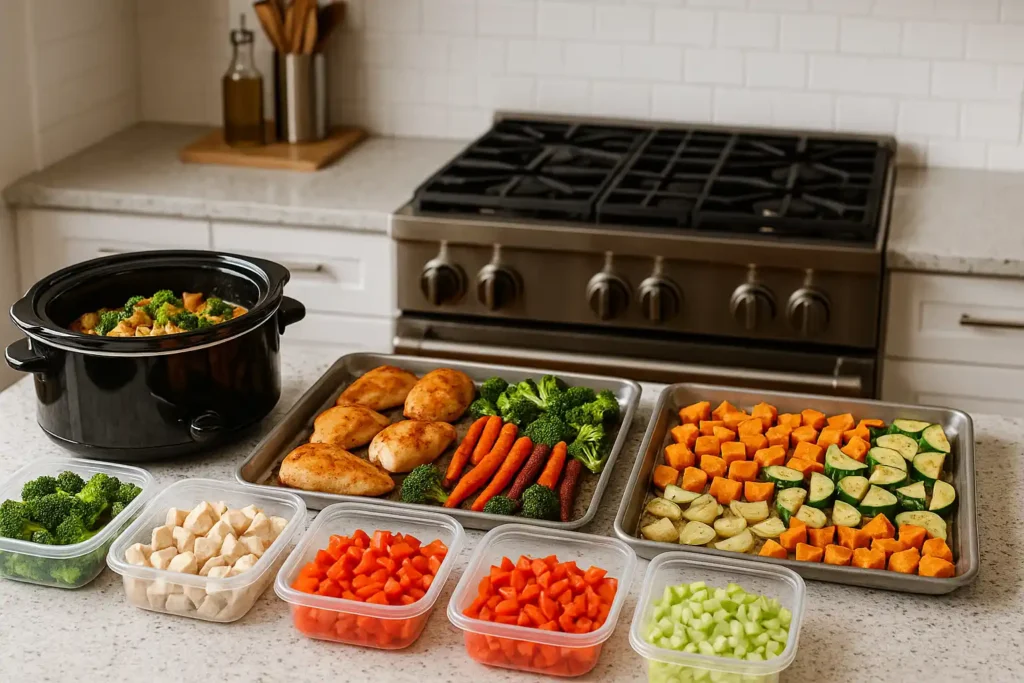
- Protein Power Hour: Dedicate time to cook large quantities of versatile proteins. Roast several chicken breasts, bake a large salmon fillet, or cook a big batch of ground turkey or beef. These can be used in various meals throughout the week.
- Vegetable Prep: Wash, chop, and store your low-carb vegetables in advance. Roast large trays of broccoli, asparagus, or bell peppers. Spiralize zucchini or prepare cauliflower rice ahead of time.
- One-Pan Wonders: Utilize sheet pan meals where proteins and vegetables cook together on a single baking sheet. This minimizes cleanup and is perfect for “high protein low carb meal prep.”
- Slow Cooker Saviors: Use a slow cooker for tender, flavorful meats like pulled chicken or beef, which can be easily incorporated into salads, lettuce wraps, or low-carb bowls.
C. Low Carb High Protein Meal Prep: Creative Substitutions and Assembly Hacks
These hacks help you enjoy your favorite meals in a low-carb, high-protein format.
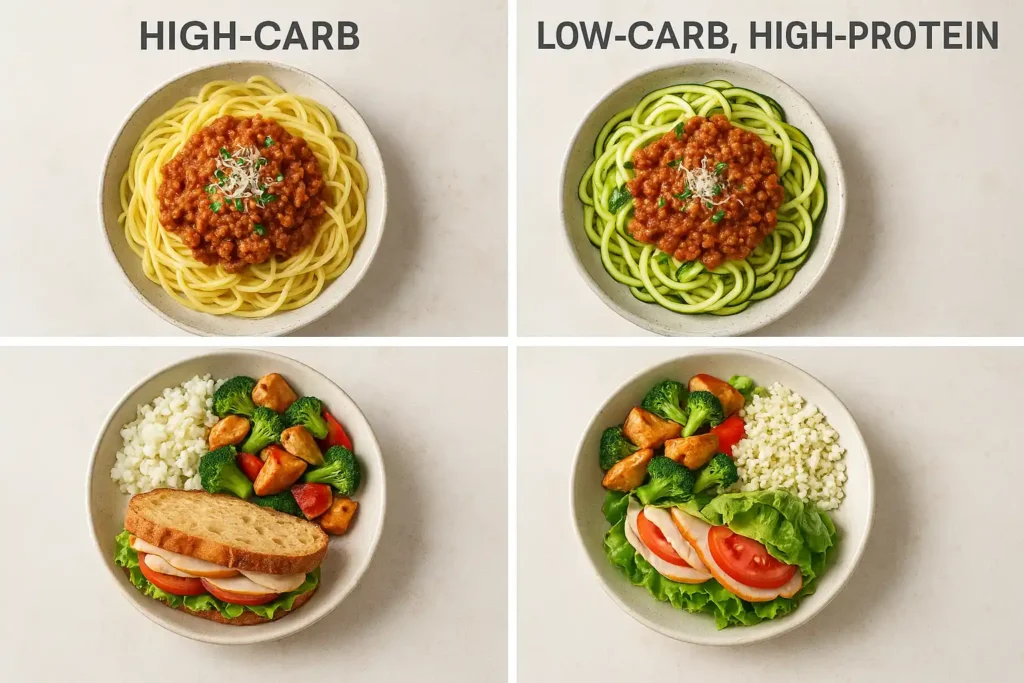
- Cauliflower Everything: Use cauliflower as a base for rice, mashed potatoes, or even pizza crusts. It’s incredibly versatile for “low carb high protein meal prep.”
- Lettuce Wraps & Bowls: Replace bread, buns, and tortillas with large lettuce leaves or simply serve your meals in bowls. This is a simple yet effective hack for “high protein low carb meal prep.”
- Zoodles & Shirataki: Swap traditional pasta for zucchini noodles or shirataki noodles. They absorb flavors well and are virtually carb-free.
- High-Fat Dressings & Sauces: Use olive oil-based dressings, avocado-based sauces, or creamy, full-fat dairy dressings to add flavor and healthy fats without extra carbs.
III. Featured Recipe: Low Carb High Protein Chicken Fajita Bowls
This recipe is a vibrant, flavorful, and easy-to-prepare example of a “low carb high protein meal prep” that’s perfect for lunch or dinner. It’s designed for batch cooking and can be customized to your taste.
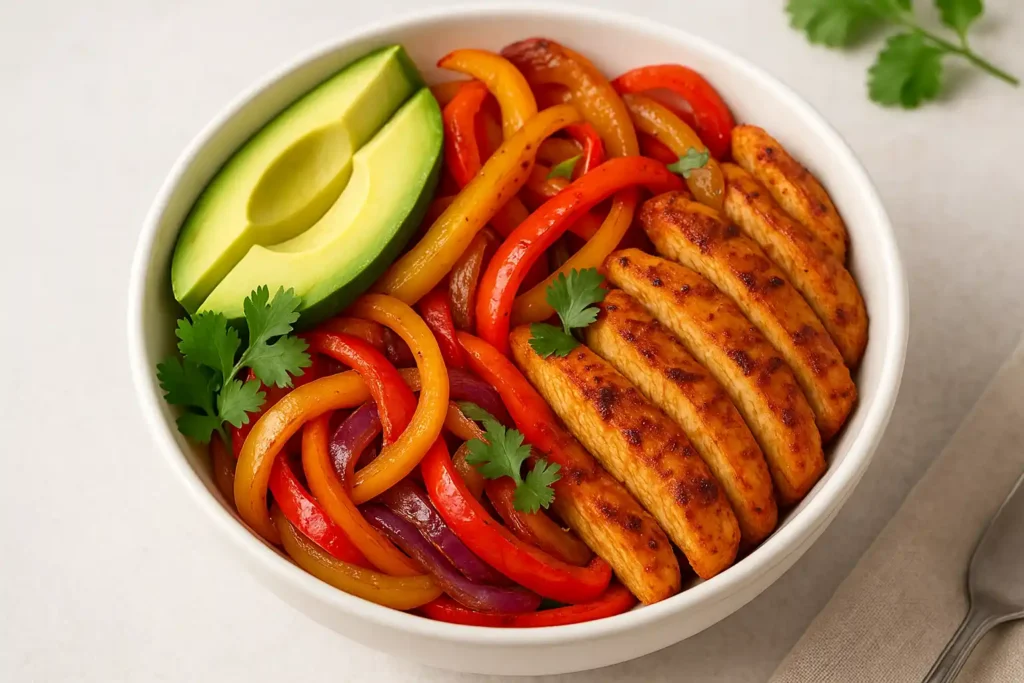
Ingredients:
- 1.5 lbs boneless, skinless chicken breast, thinly sliced
- 2 tbsp olive oil
- 1 tbsp chili powder
- 1 tsp cumin
- 1/2 tsp smoked paprika
- 1/2 tsp garlic powder
- 1/4 tsp cayenne pepper (optional, for heat)
- Salt and black pepper to taste
- 3 large bell peppers (various colors), thinly sliced
- 1 large onion, thinly sliced
- 4 cups cauliflower rice (fresh or frozen)
- For serving:
- Avocado slices
- Fresh cilantro, chopped
- Lime wedges
- Plain Greek yogurt or sour cream (optional)
Instructions:
- Marinate Chicken: In a large bowl, combine sliced chicken with 1 tbsp olive oil, chili powder, cumin, smoked paprika, garlic powder, cayenne pepper (if using), salt, and pepper. Toss well to coat. Let marinate for at least 15 minutes, or up to 30 minutes in the refrigerator.
- Prepare Veggies: In a separate bowl, toss sliced bell peppers and onion with the remaining 1 tbsp olive oil, salt, and pepper.
- Cook Chicken & Veggies: Heat a large skillet or cast-iron pan over medium-high heat. Add half of the chicken and cook for 5-7 minutes, stirring occasionally, until cooked through and slightly browned. Remove chicken and set aside. Repeat with the remaining chicken. Add the bell peppers and onion to the same skillet and cook for 8-10 minutes, stirring occasionally, until tender-crisp and slightly charred.
- Prepare Cauliflower Rice: While chicken and veggies are cooking, prepare your cauliflower rice. If using fresh, you can quickly sauté it in a separate pan for 3-5 minutes. If frozen, follow package instructions (often microwave or stovetop).
- Assemble Bowls: Divide the cooked cauliflower rice among 4 meal prep containers. Top each with equal portions of cooked chicken and fajita vegetables. Add avocado slices and fresh cilantro to each container.
- Storage: Allow meals to cool completely before covering and refrigerating. They will stay fresh for up to 4 days. Store optional toppings like Greek yogurt or lime wedges separately.
IV. Low Carb High Protein Meal Prep: Summary Table
| Meal Component | Low Carb High Protein Option | Traditional High Carb Alternative | Benefits |
|---|---|---|---|
| Protein Base | Grilled Chicken, Salmon, Tofu | Breaded Chicken, Fried Fish | Lean, high satiety, muscle support |
| Carb Source | Cauliflower Rice, Zucchini Noodles | White Rice, Pasta | Lower glycemic impact, more fiber |
| Wraps/Bases | Lettuce Wraps, Low-Carb Tortillas | Bread, Buns, Regular Tortillas | Reduced carb intake, gluten-free |
| Fats | Avocado, Olive Oil, Nuts | Processed Oils, Trans Fats | Healthy fats, sustained energy |
| Vegetables | Non-starchy vegetables (broccoli, spinach) | Starchy vegetables (potatoes, corn) | High in nutrients, low in carbs |
V. The Strategic Fueling of Champions: A Low Carb High Protein Perspective
In the high-stakes world of professional sports, particularly in the grueling final stages of a championship like the NBA Finals, every nutritional decision is critical. Athletes often employ precise dietary strategies to maintain peak physical condition, and for some, a “low carb high protein meal prep” approach can be a game-changer. Imagine a player needing to maintain lean muscle mass and explosive energy without the inflammatory effects of excessive carbohydrates, especially leading up to a pivotal Game 7. Their meal prep would be meticulously designed to provide sustained energy from fats and ample protein for rapid recovery and muscle repair. This strategic fueling allows them to perform at their absolute best, minimizing fatigue and maximizing resilience under immense pressure. The discipline and foresight required for such an elite nutritional strategy mirror the dedication needed to consistently execute effective “high protein low carb meal prep” in your daily life, ensuring you are always ready to perform at your highest level.

Frequently Asked Questions (FAQ):
Your Answers, Our Stories
What happens when we eat a high-protein low carbohydrate meal?
When you consume a high-protein, low-carb meal, your body shifts its energy source from glucose (from carbs) to fats and proteins. This can increase satiety, reduce cravings, and encourage the body to burn fat for fuel. It also supports muscle maintenance, especially when paired with physical activity.
What are the risks of a high protein diet?
A high-protein diet is generally safe for most healthy individuals, but potential risks include dehydration, kidney strain (especially in those with preexisting kidney issues), and nutrient imbalances if vegetables and fiber-rich foods are neglected. It’s important to stay hydrated and ensure a balanced intake of vitamins and minerals.
What are the benefits of a high-protein, low-carb diet?
This diet supports fat loss, stabilizes blood sugar, reduces appetite, preserves muscle mass, and enhances metabolic health. It may also improve insulin sensitivity and reduce inflammation, making it popular for weight loss and fitness goals.
How to follow a high-protein low-carb diet?
Start by prioritizing lean protein sources (e.g., poultry, fish, eggs), cutting out refined carbs (like bread, pasta, and sugar), and increasing low-carb vegetables. Meal prep is key—plan your meals ahead, batch-cook proteins, and use low-carb substitutes like cauliflower rice or zoodles.
What’s better — high protein fast food options or high protein meal prep?
High protein fast food options are great in a pinch — think grilled chicken, lettuce wraps, or protein bowls. But high protein meal prep wins for control, cost, and clean ingredients. Use fast food as backup, but prep to stay on track. Consistency is easier when your meals are ready before hunger hits.
Is too much protein bad on low-carb?
Excessive protein intake can lead to an overproduction of glucose via gluconeogenesis, which might stall ketosis if you’re aiming for it. However, for most non-ketogenic diets, high protein is not inherently bad unless overconsumed or combined with insufficient hydration and fiber.
What are the benefits of a high protein diet?
High protein intake promotes muscle growth and repair, increases satiety, boosts metabolism, and supports weight management. It’s especially beneficial for active individuals, older adults preventing muscle loss, or anyone looking to control appetite and stabilize energy levels.
Conclusion
Embracing “low carb high protein meal prep hacks” is a highly effective way to streamline your diet, achieve your health goals, and maintain consistent energy levels. By focusing on smart ingredient choices, utilizing efficient batch cooking techniques, and employing creative low-carb substitutions, you can transform your meal preparation into a seamless and enjoyable process. Whether your aim is fat loss, muscle gain, or simply a healthier lifestyle, the principles of “high protein low carb meal prep” offer a powerful framework. Just as professional athletes meticulously plan their nutrition for peak performance, you too can leverage these hacks to fuel your body optimally, ensuring you are always prepared for whatever challenges come your way. Start implementing these strategies today and experience the transformative power of a well-executed low-carb, high-protein diet!
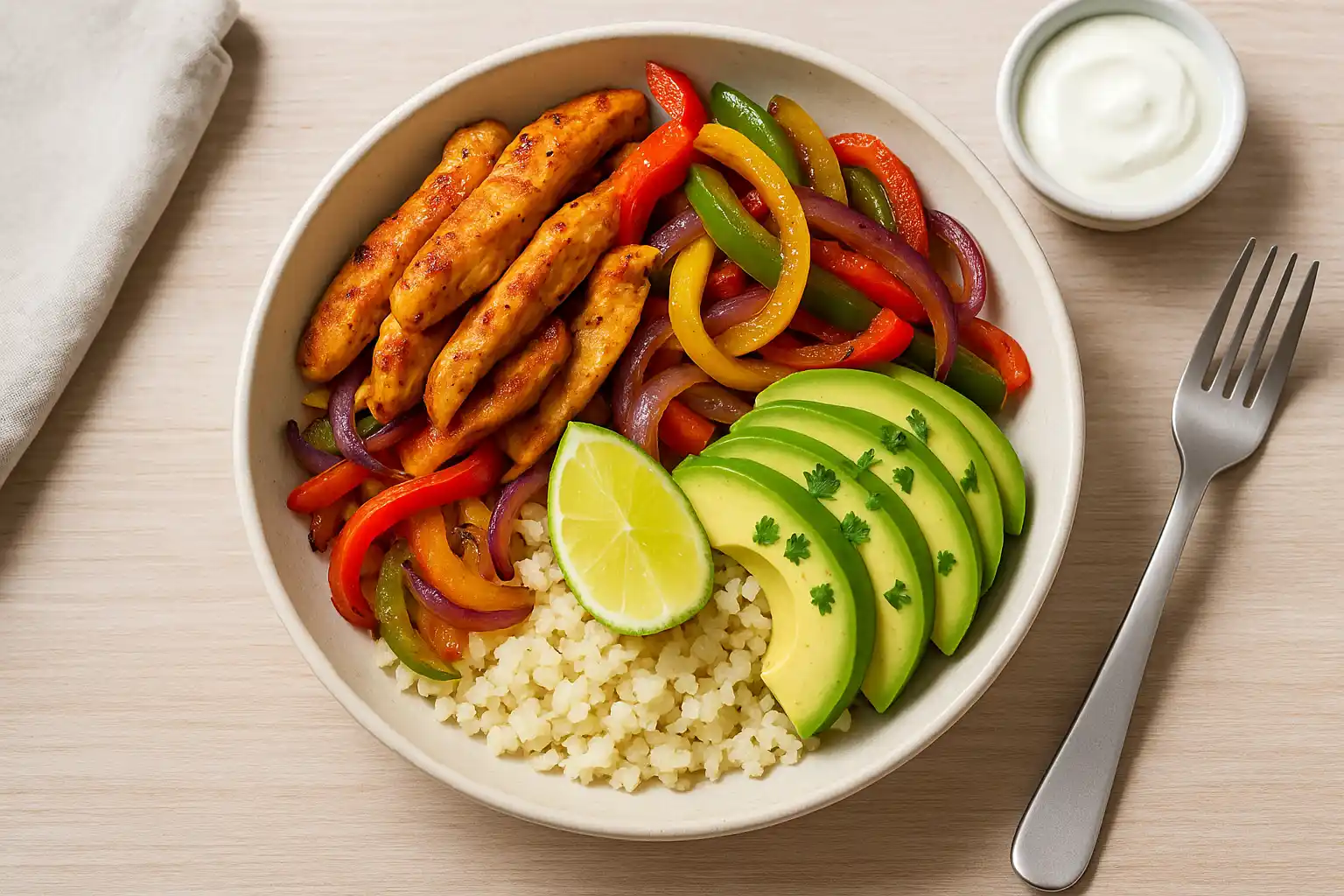
Low Carb High Protein Chicken Fajita Bowls
Ingredients
Equipment
Method
- In a large bowl, combine sliced chicken with 1 tbsp olive oil, chili powder, cumin, smoked paprika, garlic powder, cayenne pepper (if using), salt, and pepper. Toss well to coat. Let marinate for at least 15 minutes, or up to 30 minutes in the refrigerator.
- In a separate bowl, toss sliced bell peppers and onion with the remaining 1 tbsp olive oil, salt, and pepper.
- Heat a large skillet or cast-iron pan over medium-high heat. Add half of the chicken and cook for 5-7 minutes, stirring occasionally, until cooked through and slightly browned. Remove chicken and set aside. Repeat with the remaining chicken.
- Add the bell peppers and onion to the same skillet and cook for 8-10 minutes, stirring occasionally, until tender-crisp and slightly charred.
- While chicken and veggies are cooking, prepare your cauliflower rice. If using fresh, you can quickly sauté it in a separate pan for 3-5 minutes. If frozen, follow package instructions (often microwave or stovetop).
- Divide the cooked cauliflower rice among 4 meal prep containers. Top each with equal portions of cooked chicken and fajita vegetables. Add avocado slices and fresh cilantro to each container.
- Allow meals to cool completely before covering and refrigerating. They will stay fresh for up to 4 days. Store optional toppings like Greek yogurt or lime wedges separately.
Notes
References
[1] Weigle, D. S., Breen, P. A., Matthys, C. E., Callahan, H. S., Meehan, K. E., Kelley, V. E., & Purnell, J. Q. (2005). A high-protein diet induces sustained reductions in appetite, ad libitum caloric intake, and body weight despite compensatory changes in diurnal plasma leptin and ghrelin concentrations. The American Journal of Clinical Nutrition, 82(1), 41–48. https://www.sciencedirect.com/science/article/pii/S0002916523295076?via%3Dihub
[2] Volek, J. S., Phinney, S. D., Forsythe, C. E., Quann, B. R., Wood, R. J., Liu, W., … Fernandez, M. L. (2009). Carbohydrate restriction improves the features of Metabolic Syndrome. Metabolic Syndrome and Related Disorders, 7(5), 387–397.
https://pubmed.ncbi.nlm.nih.gov/16288655/
